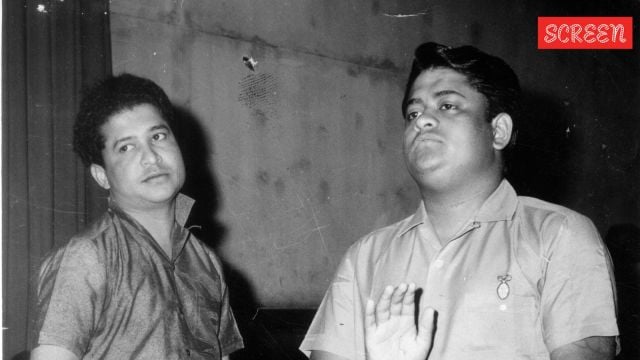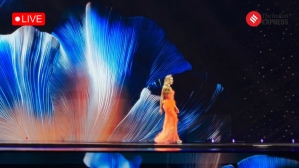Click here to follow Screen Digital on YouTube and stay updated with the latest from the world of cinema.
Bollywood’s most prolific jodi met when they were 10 and 7, worked together for half a century; industry turned their back on them
He was spotted by legendary singer Lata Mangeshkar and was referred to several famous composers of those time. He gave his first hit composition at 24.
 Music Director Laxmikant and Pyarelal. (Photo: Express Archive)
Music Director Laxmikant and Pyarelal. (Photo: Express Archive)‘Ek Do Teen’, ‘Dafli Wale’, and ‘Amar Akbar Anthony’ — these timeless classics continue to echo across generations, a testament to the genius of the legendary music duo Laxmikant–Pyarelal. Their partnership, born out of friendship and nurtured through passion, ruled the Hindi film industry for nearly three decades until Laxmikant’s untimely demise.
Born on Diwali in 1937, Laxmikant Shantaram Kudalkar lost his father at a young age. With the family facing financial hardships, he gave up his studies and began learning the mandolin under his father’s friend. It was his first step into the world of music.
After training for two years under renowned mandolin player Hussain Ali, Laxmikant started organising Indian classical concerts to earn a living. As a child, he also acted in films such as Bhakt Pundalik and Aankhen (1949), along with a few Gujarati movies.
 Music Director Laxmikant and Pyarelal. Express archive photo
Music Director Laxmikant and Pyarelal. Express archive photo
According to Rajiv Vijayakar’s book Music by Laxmikant Pyarelal, the duo first met as children — Laxmikant was 10 and Pyarelal just 7 — at the Mangeshkars’ music academy, Sureel Kala Kendra. Along with Hridaynath and Usha Mangeshkar, they performed in stage shows, often taking long walks afterward — moments when they would compose their earliest melodies together.
Their talent soon caught the attention of Lata Mangeshkar, who discovered Laxmikant playing the mandolin during a performance at the Radio Club. Impressed, she recommended him to great composers of that time: Shankar-Jaikishan, Ghulam Mohammed, and Jaidev, among others.
 Director K Parvez flanked by Laxmikant and Pyarelal at the song recording of film CHHAILA BABU. Express archive photo
Director K Parvez flanked by Laxmikant and Pyarelal at the song recording of film CHHAILA BABU. Express archive photo
After assisting senior composers separately, Laxmikant and Pyarelal reunited under Kalyanji-Anandji, first working together on the 1959 film Chandrasena. Their collaboration flourished, setting the stage for their independent debut a few years later.
There was a point when Pyarelal nearly gave up and planned to move to Venice to play the violin, but Laxmikant’s unshakable faith kept their dream alive. That faith paid off when their music for Parasmani (1963) struck gold — songs like ‘Hansta Hua Noorani Chehra’ and ‘Woh Jab Yaad Aaye’ became instant hits, cementing their place in Bollywood.
The following year, their compositions for Rajshri Productions’ Dosti (1964) made them household names. Success, however, never changed Laxmikant’s humility or passion for music. Despite decades of acclaim, he remained grounded.
 Music Director Pyarelal, Laxmikant and Playback singer Mohammad Rafi. Express archive photo
Music Director Pyarelal, Laxmikant and Playback singer Mohammad Rafi. Express archive photo
Producer Boney Kapoor once revealed, “I forced them to take more money for Roop Ki Rani Choron Ka Raja and Prem, but Laxmi-ji said that every producer cannot afford high fees.” Similarly, filmmaker Ravi Tandon recalled that when he approached composers for his first low-budget film, most discussed money — except Laxmikant.
“He was more concerned about how I would manage my finances. When I told him about my constraints, he simply said, ‘You look after the money. We will look after the music.’ That won my heart.”
However, in his later years, Bollywood turned its back to them and they had no work. Lyricist Sameer remembered telling him that he had everything — wealth, fame, and family — to which Laxmikant replied, “An artiste lives for his work. I have earned enough for generations, but I have no work.” He passed away less than two years later.
Such was his devotion that he famously returned to the studio right after his wedding to continue composing. From a slum dweller, he built a fortune and a legacy that would last lifetimes. In 1998, at the age of 63, Laxmikant passed away due to renal failure, marking the end of an era. Yet, more than 26 years later, he made headlines when Pyarelal received the Padma Bhushan in 2024.
Laxmikant’s daughter Rajeshwari told PTI, “We were very happy Pyarelal uncle was finally awarded. But when it comes to the Padma Bhushan, you can’t divide LP and give it to one just because the other is no longer with us.” She added, “Pyare uncle definitely deserves it — and so does my dad, because the work and the contribution were always shared equally.”


- 01
- 02
- 03
- 04
- 05
































